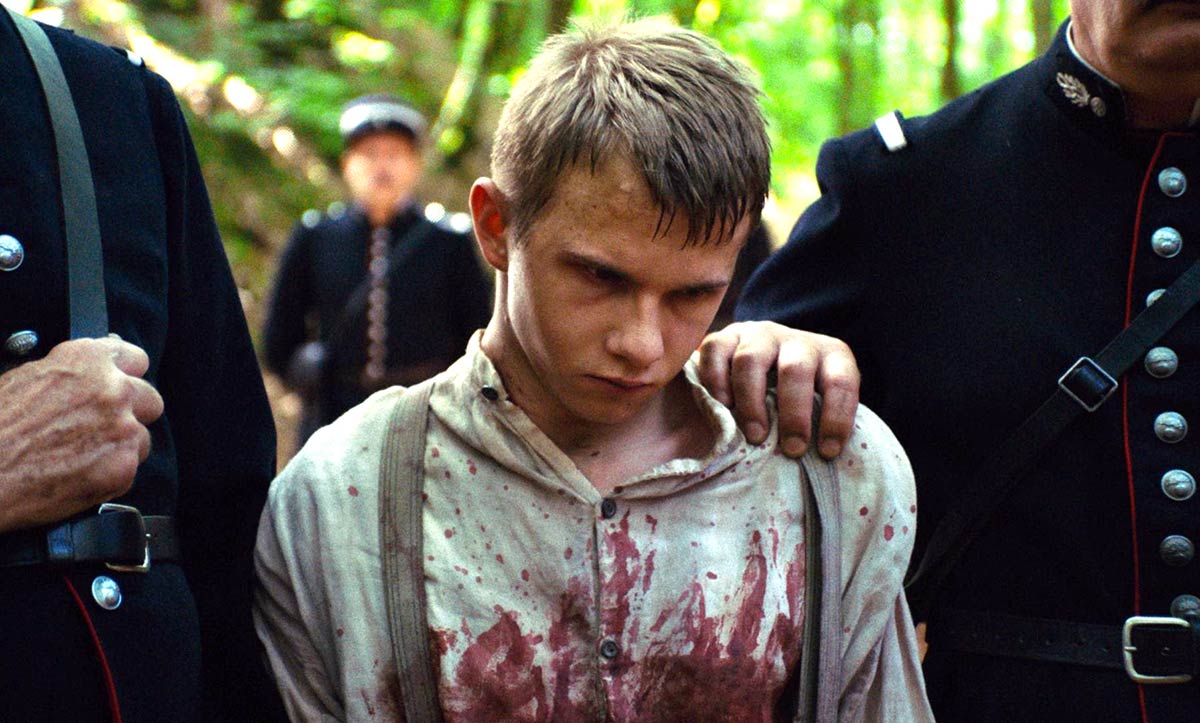The rise in popularity of true crime stories has seen the line between genuine investigation and lurid exploitation become increasingly blurred. With every new Netflix docu-series, podcast episode, and beach-read paperback, content creators are having to go further afield to dig up some crime forgotten to history to recast in a light that often appears oriented for entertainment first, with any richer insights an inadvertent byproduct. Grappling with where the ethical line needs to be drawn in depicting true crime stories requires an entirely different article, but Vincent Le Port’s “Bruno Reidal, Confession of a Murderer,” for almost every minute of its running time, begs the question of what purpose was served in making the film.
READ MORE: Cannes Film Festival 2021 Preview: 25 Films To Watch
The set-up is straightforward, with the film opening in media res as 17-year-old Bruno Reidal (Dimitri Dore) finishes beheading 13-year-old Francois Raulhac (Tristan Chiodetti), in the bucolic surroundings of the French countryside, in the autumn of 1905. Immediately after committing the crime, he calmly turns himself in, and in prison, meets with a trio of doctors, led by Professor Lacassagne (Jean-Luc Vincent), who has been tasked with determining his sanity. They ask Bruno to write down a history of his life, leading up to and including the murder. This forms the basis of Le Port’s screenplay which establishes a series of flashbacks that detail the bitter existence of Bruno (played at younger ages by Roman Villedieu and Alex Fanguin). Beaten by both his father and mother, sexually assaulted by a stranger, and frequently suicidal, Bruno’s life is tragic and the ticked boxes of experiences that lead him to connect violence with sexual pleasure, and eventually sating that desire, is unsurprising. What’s disappointing is the filmmaker’s decision to refuse to engage with or scrutinize the facts beyond how they were recorded over one hundred years ago.
Le Port ambitiously aims to present the unadorned story of a psychopath, with neither sympathy nor condemnation. Rather, he wants the audience to consider what unfolded from a wholly detached perspective. To the director’s credit, this includes giving crucial time to Bruno’s spell at a seminary school, a period in his life when he was happiest (relatively speaking), finding enough in ecclesiastical studies to, at least for a time, suppress his darkest impulses. However, Le Port can’t help but lean toward the sensational and unsubtle, which in turn brings unintended editorialization to his otherwise austere drama, such as a scene in which Bruno masturbates with his penis in one hand and a knife furiously stabbing a tree in the other. As his hunger to kill grows, Bruno is also frequently shot glowering at potential victims or brooding morosely on his lonesome. More critically, the director eventually depicts the entirety of Francois Raulhac’s murder that we only glimpsed in the film’s opening moments. We’ve already seen Bruno conclude conducting the crime, with the victim off-camera, and then present himself, blood-spattered, to account for his actions. The monstrousness of what he had done is never in question, so the only conclusion is that Le Port has included the sequence for no other reason than its cinematic and provocative effect. It completely undermines the director’s intentions and turns what is an otherwise flawed, but distinctive profile into something distasteful and deeply miscalculated.
READ MORE: Summer 2021 Preview: Over 50 Movies To Watch
Earlier this year, Tobias Lindholm delivered the miniseries “The Investigation,” which looked at a true crime, without depicting the murder, naming the criminal, or showing the victim at the time of their death, across the entirety of six hours. Not only is it a breath of fresh air, but it is also a richly layered and deeply compelling drama, and shows how a true-crime tale could be weaved into storytelling that balances the need for entertainment without falling into the pitfalls of easy titillation. Le Port never gets the balance right, and moreover, misunderstands the shortcomings in trying to remain “objective.” There is never any true reckoning with the bias of a murderer telling their own story, nor the limitations that Lacassagne might’ve faced in trying to understand Bruno’s motivations, with only the early days of psychological criminal thought at his disposal. Presenting Bruno’s life, seemingly unvarnished, is somewhat dishonest; it ignores what one hundred years of context might bring to the table. Le Port only glancingly considers how Bruno’s repressed homosexuality and attraction to his classmate, Blondel (Tino Vigier), might’ve played a role in manifesting itself violently, but it’s too little and arrives too late. So too are the quasi-spiritual elements, mostly delivered from choice score selections by composer Olivier Messiaen (particularly “Louange à l’Éternité de Jésus”), that try to anchor Bruno’s confusion and distress over the moral center he knows he lacks.
What does the murder of Francois Raulhac by Bruno Reidal in 1905 mean to us in 2021? It’s the central question that Vincent Le Port’s film is unable to answer. We spend almost every frame of ‘Confession’ with Bruno, no more understanding of him at the end of the film than we did at the beginning. There is a certain horror about an otherwise banal adolescent who is capable of such harm, but Le Port’s film is never insightful enough to draw that out, or rich enough to penetrate beyond its surface layer. It leaves us with a criminal portrait that, for all of its carefully selected hyperfocus, completely fails to see the big picture. [D]
Follow along with our full coverage from the 2021 Cannes Film Festival here.





